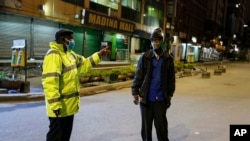Kenya’s Independent Policing Oversight Authority (or IPOA) on Thursday announced a police officer was being charged with murder in the shooting death of Yassin Hussein Moyo.
The thirteen-year-old boy was standing on the balcony of his parent’s home in Nairobi on March 30 when he was hit by a bullet as police enforced a nighttime coronavirus curfew.
Jonathan Lodompui, vice chairman of the policing oversight authority, a civilian group established to investigate and audit police misconduct, says more officers have been disciplined, but he would not disclose how many.
“They have really been disciplined. Some of them have been recalled, some of them have been interdicted, and some certain disciplinary action or role models have been preferred against them," he said.
The IPOA said Thursday that five other police officers were facing charges over other deaths, shootings, and assaults that pre-dated Kenya’s curfew.
In a statement earlier this week, the oversight body said 15 deaths linked to police during the curfew are under investigation.
But rights groups say since Kenya’s curfew began March 27 police are responsible for at least 26 deaths, the vast majority in poor neighborhoods.
Juliet Wanjira is secretariat of the Mathare Social Justice Centre, an organization that documents extrajudicial police killings. She says charges brought against officers has not led to fewer civilians being killed.
“Arresting the killer of Yassin Moyo is not going to bring Yassin Moyo back. It’s not going to. What is justice really? Justice is preventing Yassin Moyos from being killed, and that is what we need IPOA and this government to do.”
Public anger is beginning to boil over.
Video on social media showed protesters defying the curfew Monday night in Nairobi‘s Mathare slum and setting tires on fire in outrage over the shooting death of an elderly homeless man.
The protesters accuse Kenyan police of killing the man, whom locals called Vaite, while enforcing the curfew.
Speaking to Kenya’s NTV news Tuesday, Kenya Police Spokesman Charles Owino claimed that Vaite was shot not by police but by men on motorcycles.
“If any police officer, including myself, if I take the law into my own hands and kill someone, you will not need to expose it. I’ll be taken to court," Owino said.
The police oversight authority says Vaite’s death is one of those being investigated.
The IPOA says 87 complaints of police violence have been lodged since the curfew, including shootings, robbery, and sexual assault.
The executive director of Amnesty International Kenya, Irungu Houghton, says the spike in cases shows that not enough disciplinary actions are being taken.
“If you continue to retain a veil of secrecy around both the disciplinary actions that you’re taking and the officers that are being disciplined, then essentially what you are sending is a signal to the other officers is that they can continue doing what they’re doing and that there will be no consequences.”
Kenya’s prosecution of police officers is exceedingly rare. Since the IPOA's establishment in 2012, Kenya has convicted only seven police for unlawful deaths.




